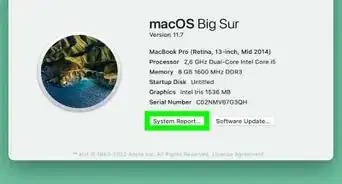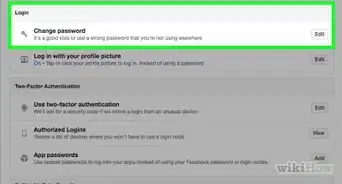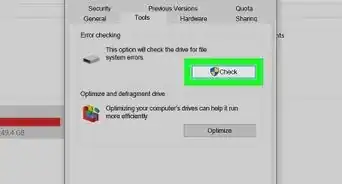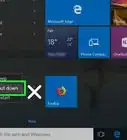This article was co-authored by Mitch Harris. Mitch Harris is a Consumer Technology Expert based in the San Francisco Bay Area. Mitch runs his own IT Consulting company called Mitch the Geek, helping individuals and businesses with home office technology, data security, remote support, and cybersecurity compliance. Mitch earned a BS in Psychology, English, and Physics and graduated Cum Laude from Northern Arizona University.
This article has been viewed 45,293 times.
With all the latest technological advancement, especially on the web, people with ill intentions have also expanded their threat up to the cyber world. You can be a victim, not only in the real world, but also as you surf the Internet. Cybercrimes has been so chronic that most have already made a crime punishable by law. As a member of the community, we have a responsibility to prevent cybercrimes in our own little ways.
Steps
Preventing Hacking
-
1Avoid using public networks. Refrain from connecting to free Wi-Fi networks from coffee shops or other public places. Connecting your device to public networks exposes it potential hackers that can easily get through the low level security of these kinds of networks.[1]
-
2Avoid using public computers for sensitive business. If you’re about to do some personal transactions like banking or online shopping, do not do it using public computers. Other people who have used the computers before you may have put programs that can record the passwords you type in.Advertisement
-
3Do not give out your passwords. Keep the passwords of your various accounts to yourself. If you do let someone know, make sure to change it afterwards to prevent that person from accessing your private internet accounts without permission.[2]
-
4Avoid downloading unknown applications. The Internet is full of free software from unknown sources. These kinds of programs normally carry malicious applications with it and installing it may infect and cause serious damage to your computer.[3]
Preventing Cyber Bullying
-
1Don’t mind bashers. Bashers or “trolls” are Internet surfers that purposely agitate other users to start discussion which may later lead to verbal abuse.
- If you see people posting or replying bad comments to your online posts, do not reply back. Bashers commonly seek attention and will soon back away if they’re not given any thought.
-
2Don’t be affected with what you read. Don’t be emotionally affected by the things you read on the net. Remember that these things are only words and cannot hurt you directly.
-
3Report cyber bullies. If you see people verbally harassing other users, talk to the administrators or moderators of the website and report that person who’s bullying other people.
-
4Leave the computer. If you can’t seem to find any way to stop cyber bullies, get off the Internet and shut your computer off. Cyber bullies only exist on the Internet and would cease to be as soon as you log out.
Preventing Online Piracy
-
1Avoid downloading illegal contents. Purchase media contents straight from legitimate sources only, like iTunes or Amazon.
-
2Stop sharing contents freely to other users. Do not share or make copies of music, movies, or any kind of copyrighted media over the internet. Doing so can constitute to online piracy, which is punishable under the federal law.
-
3Report any site that shares pirated contents. If you come across websites that shares illegal contents, contact your ISP or local government units responsible for handling such kinds of issues and report these kinds of illegal activities.
Preventing Online Pornography
-
1Block pornographic websites. Set the antivirus application you’re using to block websites that shows pornographic contents. If you’re connected to a smaller network, contact your network administrator so they can restrict access to such sites.
-
2Talk with the people concerned. Speak with the members of your household who could or potentially be viewing pornographic websites. Explain to them the negative effects of opening such kinds of contents on the internet.
- Remember that sometimes, the toughest problems can be solved or prevented with a proper discussion.
-
3Report any cyber prostitution activities. If you’re aware of any online pornographic activities, such as cyber prostitution, in your area, alert your local authorities so they can take the proper actions and respond promptly to the issue at hand.
Expert Q&A
-
QuestionWho is most likely to be a victim of cybercrime?
 Mitch HarrisMitch Harris is a Consumer Technology Expert based in the San Francisco Bay Area. Mitch runs his own IT Consulting company called Mitch the Geek, helping individuals and businesses with home office technology, data security, remote support, and cybersecurity compliance. Mitch earned a BS in Psychology, English, and Physics and graduated Cum Laude from Northern Arizona University.
Mitch HarrisMitch Harris is a Consumer Technology Expert based in the San Francisco Bay Area. Mitch runs his own IT Consulting company called Mitch the Geek, helping individuals and businesses with home office technology, data security, remote support, and cybersecurity compliance. Mitch earned a BS in Psychology, English, and Physics and graduated Cum Laude from Northern Arizona University.
Consumer Technology Expert People who use similar passwords for everything may be at risk, especially if they use Google's password manager tool. Once someone learns your password, they might try logging into other accounts with it.
People who use similar passwords for everything may be at risk, especially if they use Google's password manager tool. Once someone learns your password, they might try logging into other accounts with it. -
QuestionWhat is the main cause of identity theft?
 Mitch HarrisMitch Harris is a Consumer Technology Expert based in the San Francisco Bay Area. Mitch runs his own IT Consulting company called Mitch the Geek, helping individuals and businesses with home office technology, data security, remote support, and cybersecurity compliance. Mitch earned a BS in Psychology, English, and Physics and graduated Cum Laude from Northern Arizona University.
Mitch HarrisMitch Harris is a Consumer Technology Expert based in the San Francisco Bay Area. Mitch runs his own IT Consulting company called Mitch the Geek, helping individuals and businesses with home office technology, data security, remote support, and cybersecurity compliance. Mitch earned a BS in Psychology, English, and Physics and graduated Cum Laude from Northern Arizona University.
Consumer Technology Expert The main cause of identity theft is trickery. The criminal will pretend to be someone else, like an IT professional, and try to get your password that way. In fact, most cases of identity theft occur after a person voluntarily shares their personal info.
The main cause of identity theft is trickery. The criminal will pretend to be someone else, like an IT professional, and try to get your password that way. In fact, most cases of identity theft occur after a person voluntarily shares their personal info. -
QuestionWhat kind of information gets stolen?
 Mitch HarrisMitch Harris is a Consumer Technology Expert based in the San Francisco Bay Area. Mitch runs his own IT Consulting company called Mitch the Geek, helping individuals and businesses with home office technology, data security, remote support, and cybersecurity compliance. Mitch earned a BS in Psychology, English, and Physics and graduated Cum Laude from Northern Arizona University.
Mitch HarrisMitch Harris is a Consumer Technology Expert based in the San Francisco Bay Area. Mitch runs his own IT Consulting company called Mitch the Geek, helping individuals and businesses with home office technology, data security, remote support, and cybersecurity compliance. Mitch earned a BS in Psychology, English, and Physics and graduated Cum Laude from Northern Arizona University.
Consumer Technology Expert Most cybercriminals are looking for really sensitive info, like your social security number. These types of criminals aren't really interested in stealing any suggestive photos off your computer.
Most cybercriminals are looking for really sensitive info, like your social security number. These types of criminals aren't really interested in stealing any suggestive photos off your computer.









































































